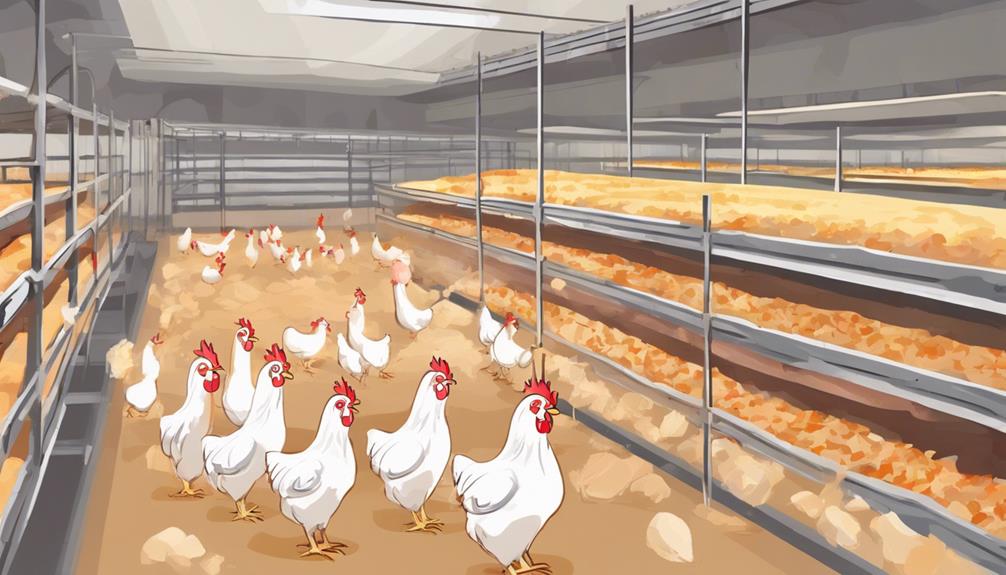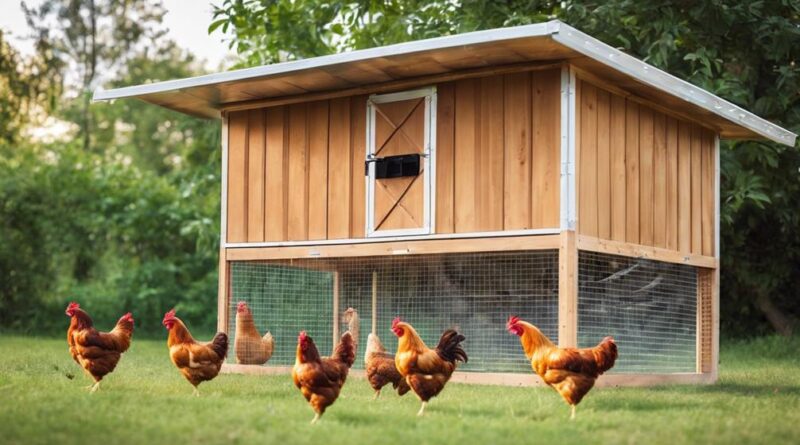Top 7 Tips for Organic Broiler Chicken Farming"
When diving into organic broiler chicken farming, prioritize these top 7 tips for success. Opt for fast-growing breeds like Cornish Cross or Red Rangers, considering your production goals and environment. Ensure proper feed formulation with nutritional balance, storage, and consultation with a poultry nutritionist. Provide 1 to 1.5 square feet per bird, good ventilation, and natural light for housing. Focus on regular cleaning, disease prevention, and pest control for cleanliness. Monitor chicken health, involve a vet, and maintain welfare and enrichment activities. Embrace sustainable practices and track growth rates. Support muscle development, health, and a clean environment. Master these tips for a thriving organic broiler farm!
Choosing the Right Breed
When selecting the right breed for your organic broiler chicken farm, consider the specific characteristics and traits that align with your production goals. Breeding selection plays a crucial role in the success of your farm. Opt for breeds known for their fast growth rates, as this is essential for efficient meat production. Look for breeds that have been selectively bred for meat production, such as Cornish Cross or Red Rangers. These breeds are renowned for their rapid growth and high meat yield, making them ideal choices for organic broiler farming.
When it comes to growth rates, it's vital to choose a breed that can reach market weight in a reasonable amount of time. Cornish Cross, for example, can reach market weight in as little as 6-8 weeks, making them a popular choice among organic broiler farmers. On the other hand, Red Rangers take slightly longer to reach market weight but are known for their excellent foraging abilities and flavorful meat.
Consider the climate and environment of your farm when selecting a breed. Some breeds are more adaptable to different climates and management practices than others. Ensure the breed you choose can thrive in your specific conditions to maximize growth rates and overall productivity. By carefully considering breeding selection and growth rates, you can set your organic broiler chicken farm up for success.
Providing Quality Feed
To ensure optimal growth and health for your organic broiler chickens, the quality of feed provided plays a crucial role in their development. Here are some key points to consider when providing quality feed for your broiler chickens:
- Feed Formulation and Nutritional Balance: When formulating feed for your broiler chickens, it's essential to ensure that the feed provides the necessary nutrients in the right proportions. A balanced diet is crucial for the chickens' growth, immune system function, and overall health. Work with a poultry nutritionist to create a feed formula that meets the specific nutritional requirements of broiler chickens at different growth stages.
- Feed Storage: Proper storage of feed is essential to maintain its quality and prevent contamination. Store feed in a cool, dry place to prevent mold growth and spoilage. Ensure that the storage containers are tightly sealed to keep out pests and moisture, which can compromise the feed quality.
- Preservation Techniques: To extend the shelf life of feed and preserve its nutritional content, consider using preservation techniques such as silage making or fermentation. These methods can help improve the digestibility of the feed and enhance the chickens' overall health and performance.
Ensuring Adequate Space
Ensuring adequate space for your organic broiler chickens is crucial for their well-being and optimal growth. Proper space utilization is essential to prevent overcrowding, reduce stress, and minimize aggressive behaviors among the chickens. When planning the space for your broiler chickens, consider providing at least 1 to 1.5 square feet of space per bird to allow them to move freely and exhibit natural behaviors.
Ventilation is another critical aspect to consider when designing the housing for your broiler chickens. Good ventilation helps maintain optimal air quality, reduces the risk of respiratory diseases, and regulates the temperature inside the coop. Ensure proper airflow by installing windows, vents, or fans to keep the air fresh and circulating.
In addition to space and ventilation, incorporating behavioral enrichment in the form of perches, platforms, or toys can help stimulate the chickens' natural instincts and prevent boredom. Providing access to natural light is also important as it helps regulate their circadian rhythm, promotes vitamin D synthesis, and positively impacts their overall well-being.
Maintaining Cleanliness
Proper cleanliness in your organic broiler chicken farm is key to preventing disease outbreaks and ensuring the health of your flock. Maintaining a high standard of sanitation and implementing good hygiene practices are essential for the well-being of your chickens.
Here are some practical tips to help you maintain cleanliness on your farm:
- Regularly clean and disinfect: Ensure that you clean and disinfect all coops, feeders, and waterers on a regular basis. Use appropriate disinfectants recommended for poultry farming to eliminate harmful bacteria and viruses.
- Manage litter effectively: Proper litter management is crucial in preventing the buildup of ammonia and harmful microorganisms. Regularly remove soiled litter and replace it with fresh bedding to maintain a dry and healthy environment for your chickens.
- Control pests: Implement measures to control pests such as flies, rodents, and mites, as they can spread diseases and pose a threat to your flock. Use traps, repellents, and safe insecticides to keep pests at bay and ensure a clean environment for your chickens.
Monitoring Health and Welfare
Monitoring the health and welfare of your organic broiler chickens is essential for detecting early signs of illness and ensuring the overall well-being of your flock. By implementing preventative care measures and staying vigilant, you can help maintain a healthy environment for your chickens.
Regularly observe your chickens for any changes in behavior, such as decreased activity, changes in eating habits, or unusual vocalizations, as these can be early indicators of health issues. Additionally, conducting routine health checks, including examining their eyes, feathers, and skin, can help you spot any abnormalities promptly.
To effectively manage diseases, it's crucial to have a veterinarian involved in your farming operation. They can provide guidance on vaccination schedules, recommend appropriate medications when needed, and offer valuable advice on disease prevention strategies. Keep detailed records of vaccinations, treatments, and any health-related observations to track the health history of each chicken. This information can be instrumental in identifying patterns or potential health risks within your flock.
Maintaining the welfare of your chickens goes beyond just physical health. Providing a stress-free environment, adequate space, and enriching activities can contribute to their overall well-being. Regularly assess housing conditions, ventilation, and cleanliness to prevent the spread of diseases. By prioritizing both preventative care and disease management, you can support the health and welfare of your organic broiler chickens effectively.
Implementing Sustainable Practices
Consider incorporating sustainable practices into your organic broiler chicken farming operation to minimize environmental impact and promote long-term viability. Implementing sustainable practices not only benefits the environment but can also positively impact the overall health and productivity of your chickens. Here are some key practices to consider:
- Soil Fertility: Utilize crop rotation techniques and organic fertilizers to maintain soil fertility. Avoid the excessive use of chemical fertilizers and pesticides, as they can harm the soil microbiome and impact the quality of your crops and pasture. Healthy soil leads to healthy vegetation, which in turn provides a better environment for your broiler chickens.
- Water Conservation: Implement water-saving strategies such as drip irrigation systems, rainwater harvesting, and regular maintenance of water sources. Conserving water is crucial for sustainable farming practices, as water is a finite resource. Ensuring adequate hydration for your chickens while managing water responsibly will contribute to the overall sustainability of your farm.
- Sustainable Feed Sourcing: Opt for locally sourced, organic feed whenever possible. Sustainable feed production practices reduce the carbon footprint of your operation and support local agriculture. By prioritizing sustainable feed sourcing, you contribute to the overall environmental health of your region while providing high-quality nutrition for your broiler chickens.
Managing Growth and Development

To effectively oversee the growth and development of your organic broiler chickens, focus on implementing tailored management practices that optimize their health and productivity. Growth management is crucial in organic broiler farming. Ensure your chickens have access to high-quality feed with the right balance of nutrients to support their growth. Utilize feeding strategies that promote steady growth without compromising their health. Monitor their weight gain regularly to adjust feeding plans accordingly and prevent issues like obesity or malnutrition.
Understanding the different development stages of broiler chickens is essential for effective management. From chick to adult, each stage requires specific care and attention. Implement a system for tracking their performance, including growth rates and feed conversion ratios. This data will help you fine-tune your management practices and ensure optimal growth and development outcomes.
As your chickens grow, provide adequate space for movement and exercise to support muscle development and overall health. Maintain a clean living environment to prevent diseases and stress, which can hinder growth. Regularly assess their development by observing behavior, checking weight gain, and consulting with a veterinarian if needed.
Frequently Asked Questions
Can Broiler Chickens Be Raised Alongside Other Poultry on the Farm?
Yes, broiler chickens can be raised alongside other poultry on the farm. This mixed species cohabitation in integrated farming systems offers benefits like pest control and efficient land use. However, challenges such as potential disease transmission and competition for resources must be managed.
Multispecies systems can promote biodiversity and enhance sustainability when carefully planned and monitored. Consider factors like space, feeding habits, and health requirements for successful cohabitation.
How Often Should Bedding Be Changed in the Broiler Chicken House?
You should change the bedding in the broiler chicken house regularly to maintain cleanliness and control odors. Proper bedding maintenance is crucial for the health of your chickens and the environment.
Dispose of used bedding properly to minimize the environmental impact. By staying on top of bedding changes, you can create a healthier living environment for your broiler chickens and ensure efficient waste management on your farm.
What Measures Can Be Taken to Prevent Common Poultry Diseases?
To prevent common poultry diseases, you can implement various preventative measures like maintaining proper hygiene, ensuring good ventilation, and providing clean water. Establishing strict biosecurity protocols and regular health monitoring can also help control disease outbreaks.
Following vaccination protocols recommended by poultry health experts is crucial for keeping your flock healthy and disease-free. By combining these strategies, you can effectively safeguard your broiler chickens against common illnesses.
Is It Possible to Use Organic Supplements in Broiler Chicken Feed?
Yes, you can use organic supplements in broiler chicken feed. It's important to follow feed regulations and guidelines when incorporating these alternatives.
Organic supplements offer a natural way to enhance the nutritional value of your chickens' feed.
Make sure to source high-quality organic supplements and consult with experts to ensure you're meeting the dietary needs of your broiler chickens effectively.
How Can Farmers Effectively Manage Aggressive Behavior Among Broiler Chickens?
If you're dealing with aggressive behavior among broiler chickens, effective management involves implementing training and behavioral intervention strategies. Utilize communication techniques to establish dominance and maintain order within the flock.
Creating a structured environment, providing adequate space, and ensuring proper nutrition can also help reduce aggression. Regular monitoring and early intervention are key in preventing escalated conflicts among the chickens.
Conclusion
In conclusion, organic broiler chicken farming requires careful consideration of:
- Breed selection
- Feed quality
- Space
- Cleanliness
- Health monitoring
- Sustainable practices
- Growth management
By following these top 7 tips, you can ensure the success of your organic broiler chicken farm.
Remember to always prioritize the well-being and welfare of your chickens to maintain a healthy and sustainable farming operation.
With dedication and proper management, you can achieve optimal results in organic broiler chicken farming.
